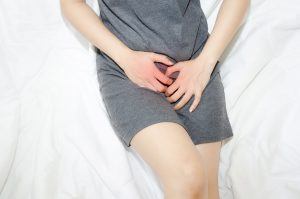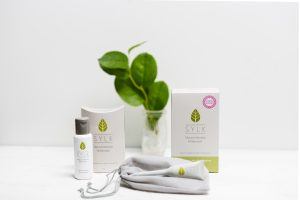
Vulval dermatitis
The skin on your vulva, the outside part of your genitals, is vulnerable to irritation in the same way as skin on anywhere else on your body. Vulvas are wet and warm and so managing irritation can take longer than somewhere you can keep cool and dry.
What is vulval dermatitis?

- itching
- burning
- pain
- soreness
- irritation
If you have look in a mirror you might see a rash, weeping, red patches and maybe thin cracks. These can be similar in appearance, but more subtle than the appearance of eczema on other body parts. Many women mistake their symptoms for thrush and self manage, often for a long time, over-the-counter anti-fungals which won’t help and this can be very frustrating.
What causes it?

If your skin is generally sensitive to wool clothing, bubble baths, cleaning products etc and you also suffer from hayfever, asthma or eczema then you may be more likely to have vulval symptoms too. Peri and post menopausal women are especially prone to vulval dermatitis, when reduced oestrogen levels have often already caused the skin to become thinner and more prone to dryness and atrophy.
How do I manage vulval dermatitis?
Dermatitis is made worse with heat, dampness and friction. Finding and removing those factors can make huge differences in symptoms. Have a think about the products you’re using too. Many can contain potential allergens that you wouldn’t normally think about. Does your toilet paper contain dyes? Do you use soap, bath oil, talcum powder, cleanser, shampoos or body lotion? Almost all contain perfumes and preservatives. Do you use latex condoms?
- You must cut out all soap, bubble bath and perfume. It is important to use a soap substitute from your chemist or GP, such as an emollient.
- Wash your vulva once a day without scrubbing, and be careful to avoid the vaginal opening. Pat dry or use a hairdryer on a cool setting.
- Wear white cotton underwear that is not too tight and don’t wear underwear at night.
- Avoid tights, trousers, g-strings and tight jeans. Try using tampons instead of sanitary pads, and, if you use pads then avoid those with colour patterns or fragrances.
- Try not to scratch as the vulval skin is very fragile, particularly after menopause. Small tears or cuts can become infected and make things worse.
- A frozen or chilled damp sanitary towel can be soothing if the itch is troublesome. Speak to your pharmacist about anti-histamine medication if the itch is severe.
Some personal lubricants and vaginal moisturisers contain preservatives or even additives that cause tingling. Sylk is a pH neutral, hypo-allergenic, non-irritating lubricant that can be used as a moisturiser too. You can use it little and often directly on the irritated skin. It can be helpful to put a small amount of Sylk on unscented toilet tissue before wiping to reduce dragging and scratching. You can order your free sample here
When should I see my GP?





